Analysis of Immanuel Kant's Hypothetical and Categorical Imperatives
VerifiedAdded on 2023/05/31
|5
|1440
|142
Essay
AI Summary
This essay provides an analysis of Immanuel Kant's moral philosophy, focusing on the distinction between hypothetical and categorical imperatives. It begins by outlining Kant's view of duty and obligation, emphasizing the role of pure reasoning in governing actions. The essay then defines and contrasts hypothetical imperatives, which are based on desires and goals, with categorical imperatives, which dictate actions regardless of desires. The paper argues that Kant's framework struggles to provide a definitive method for evaluating the morality of an action, as hypothetical imperatives are unpredictable, and categorical imperatives are not immune to exceptions due to individual morality. It explores the conditions required to meet the universal or categorical imperative, discusses whether moral necessities are categorical, and examines the relationship between rationality and morality. The essay further critiques Kant's ideas, highlighting the arguments against his doctrine that moral necessities provide motivations for actions, and concludes by stating that Kant offers no sound theories on how an action can be morally evaluated.
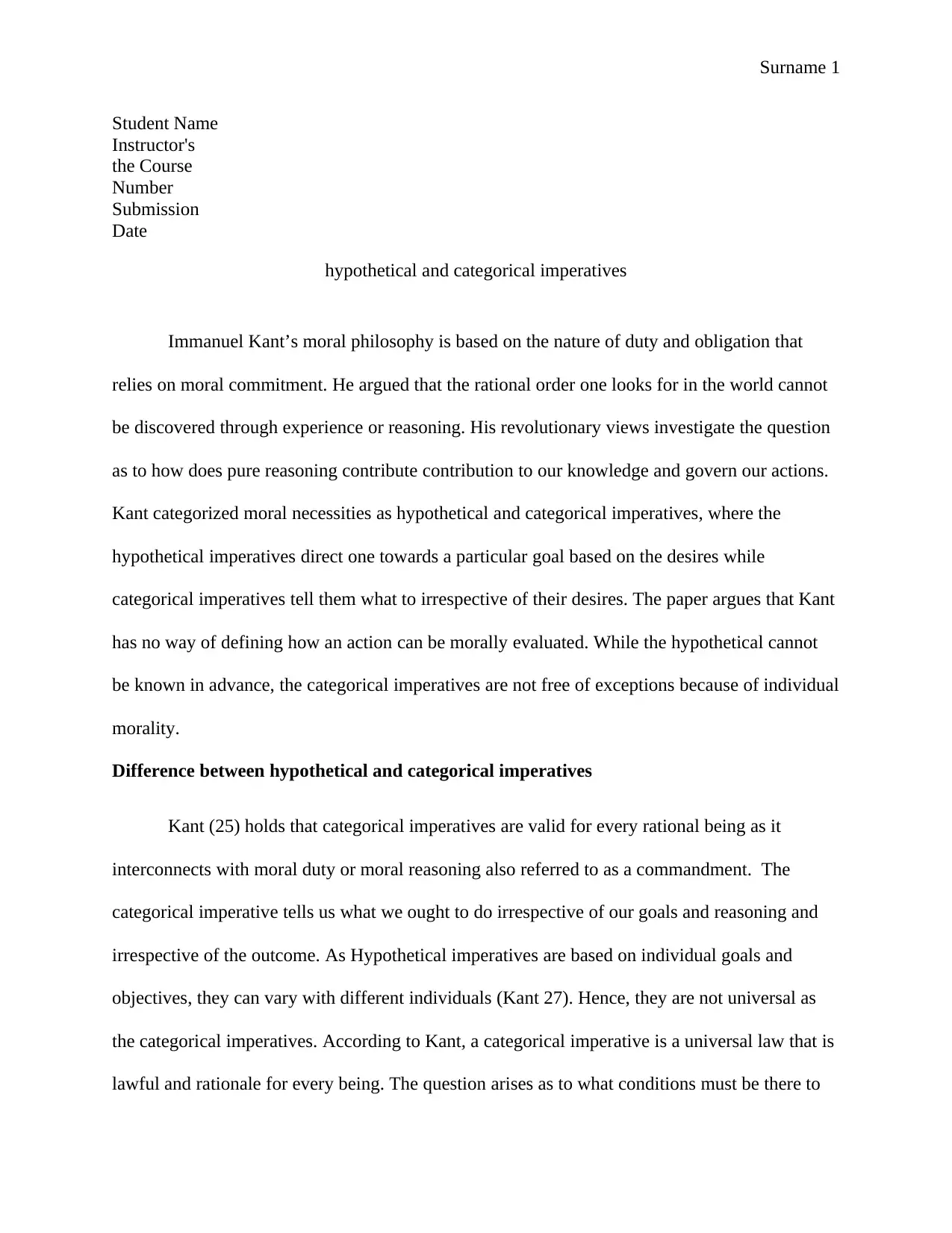
Surname 1
Student Name
Instructor's
the Course
Number
Submission
Date
hypothetical and categorical imperatives
Immanuel Kant’s moral philosophy is based on the nature of duty and obligation that
relies on moral commitment. He argued that the rational order one looks for in the world cannot
be discovered through experience or reasoning. His revolutionary views investigate the question
as to how does pure reasoning contribute contribution to our knowledge and govern our actions.
Kant categorized moral necessities as hypothetical and categorical imperatives, where the
hypothetical imperatives direct one towards a particular goal based on the desires while
categorical imperatives tell them what to irrespective of their desires. The paper argues that Kant
has no way of defining how an action can be morally evaluated. While the hypothetical cannot
be known in advance, the categorical imperatives are not free of exceptions because of individual
morality.
Difference between hypothetical and categorical imperatives
Kant (25) holds that categorical imperatives are valid for every rational being as it
interconnects with moral duty or moral reasoning also referred to as a commandment. The
categorical imperative tells us what we ought to do irrespective of our goals and reasoning and
irrespective of the outcome. As Hypothetical imperatives are based on individual goals and
objectives, they can vary with different individuals (Kant 27). Hence, they are not universal as
the categorical imperatives. According to Kant, a categorical imperative is a universal law that is
lawful and rationale for every being. The question arises as to what conditions must be there to
Student Name
Instructor's
the Course
Number
Submission
Date
hypothetical and categorical imperatives
Immanuel Kant’s moral philosophy is based on the nature of duty and obligation that
relies on moral commitment. He argued that the rational order one looks for in the world cannot
be discovered through experience or reasoning. His revolutionary views investigate the question
as to how does pure reasoning contribute contribution to our knowledge and govern our actions.
Kant categorized moral necessities as hypothetical and categorical imperatives, where the
hypothetical imperatives direct one towards a particular goal based on the desires while
categorical imperatives tell them what to irrespective of their desires. The paper argues that Kant
has no way of defining how an action can be morally evaluated. While the hypothetical cannot
be known in advance, the categorical imperatives are not free of exceptions because of individual
morality.
Difference between hypothetical and categorical imperatives
Kant (25) holds that categorical imperatives are valid for every rational being as it
interconnects with moral duty or moral reasoning also referred to as a commandment. The
categorical imperative tells us what we ought to do irrespective of our goals and reasoning and
irrespective of the outcome. As Hypothetical imperatives are based on individual goals and
objectives, they can vary with different individuals (Kant 27). Hence, they are not universal as
the categorical imperatives. According to Kant, a categorical imperative is a universal law that is
lawful and rationale for every being. The question arises as to what conditions must be there to
Paraphrase This Document
Need a fresh take? Get an instant paraphrase of this document with our AI Paraphraser
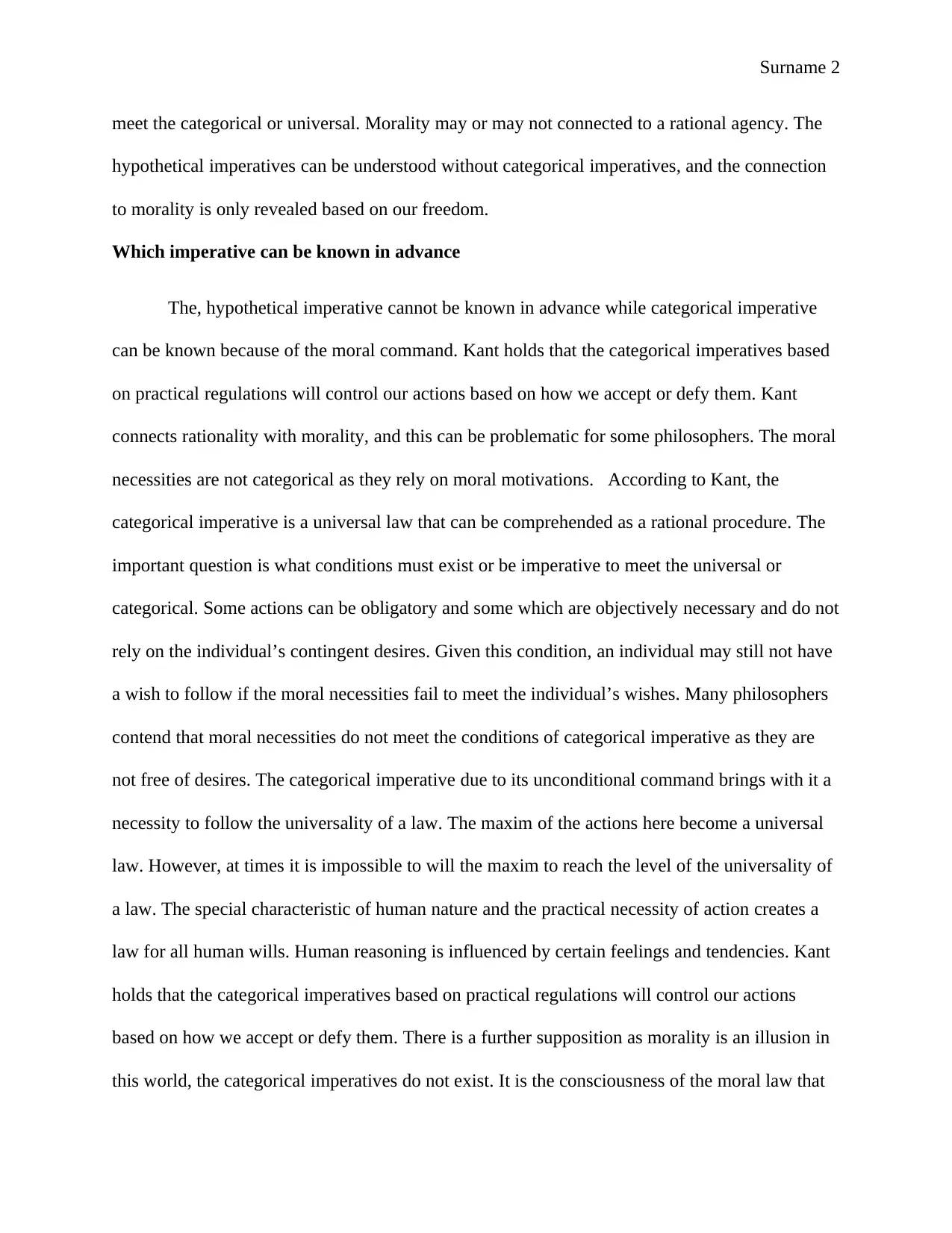
Surname 2
meet the categorical or universal. Morality may or may not connected to a rational agency. The
hypothetical imperatives can be understood without categorical imperatives, and the connection
to morality is only revealed based on our freedom.
Which imperative can be known in advance
The, hypothetical imperative cannot be known in advance while categorical imperative
can be known because of the moral command. Kant holds that the categorical imperatives based
on practical regulations will control our actions based on how we accept or defy them. Kant
connects rationality with morality, and this can be problematic for some philosophers. The moral
necessities are not categorical as they rely on moral motivations. According to Kant, the
categorical imperative is a universal law that can be comprehended as a rational procedure. The
important question is what conditions must exist or be imperative to meet the universal or
categorical. Some actions can be obligatory and some which are objectively necessary and do not
rely on the individual’s contingent desires. Given this condition, an individual may still not have
a wish to follow if the moral necessities fail to meet the individual’s wishes. Many philosophers
contend that moral necessities do not meet the conditions of categorical imperative as they are
not free of desires. The categorical imperative due to its unconditional command brings with it a
necessity to follow the universality of a law. The maxim of the actions here become a universal
law. However, at times it is impossible to will the maxim to reach the level of the universality of
a law. The special characteristic of human nature and the practical necessity of action creates a
law for all human wills. Human reasoning is influenced by certain feelings and tendencies. Kant
holds that the categorical imperatives based on practical regulations will control our actions
based on how we accept or defy them. There is a further supposition as morality is an illusion in
this world, the categorical imperatives do not exist. It is the consciousness of the moral law that
meet the categorical or universal. Morality may or may not connected to a rational agency. The
hypothetical imperatives can be understood without categorical imperatives, and the connection
to morality is only revealed based on our freedom.
Which imperative can be known in advance
The, hypothetical imperative cannot be known in advance while categorical imperative
can be known because of the moral command. Kant holds that the categorical imperatives based
on practical regulations will control our actions based on how we accept or defy them. Kant
connects rationality with morality, and this can be problematic for some philosophers. The moral
necessities are not categorical as they rely on moral motivations. According to Kant, the
categorical imperative is a universal law that can be comprehended as a rational procedure. The
important question is what conditions must exist or be imperative to meet the universal or
categorical. Some actions can be obligatory and some which are objectively necessary and do not
rely on the individual’s contingent desires. Given this condition, an individual may still not have
a wish to follow if the moral necessities fail to meet the individual’s wishes. Many philosophers
contend that moral necessities do not meet the conditions of categorical imperative as they are
not free of desires. The categorical imperative due to its unconditional command brings with it a
necessity to follow the universality of a law. The maxim of the actions here become a universal
law. However, at times it is impossible to will the maxim to reach the level of the universality of
a law. The special characteristic of human nature and the practical necessity of action creates a
law for all human wills. Human reasoning is influenced by certain feelings and tendencies. Kant
holds that the categorical imperatives based on practical regulations will control our actions
based on how we accept or defy them. There is a further supposition as morality is an illusion in
this world, the categorical imperatives do not exist. It is the consciousness of the moral law that
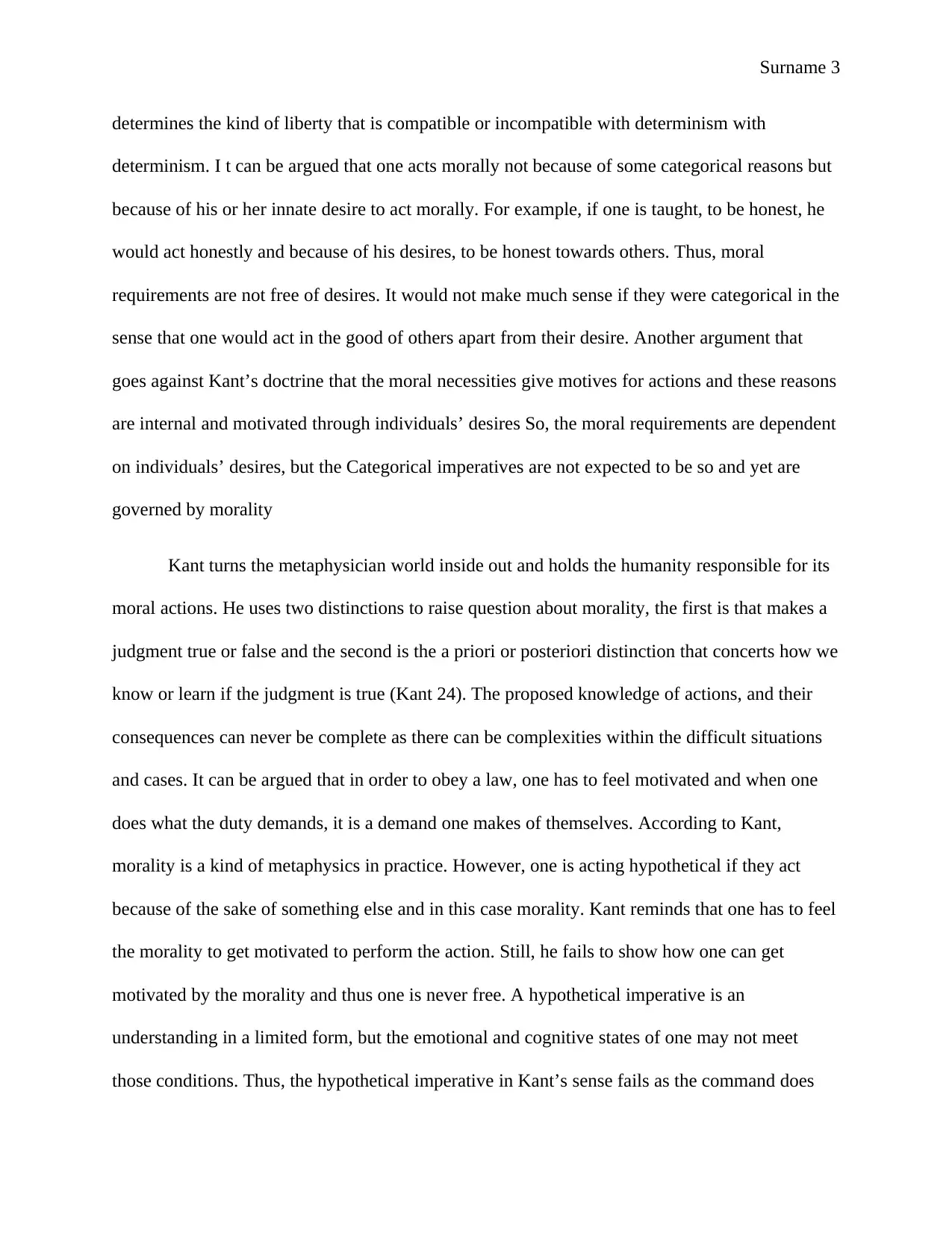
Surname 3
determines the kind of liberty that is compatible or incompatible with determinism with
determinism. I t can be argued that one acts morally not because of some categorical reasons but
because of his or her innate desire to act morally. For example, if one is taught, to be honest, he
would act honestly and because of his desires, to be honest towards others. Thus, moral
requirements are not free of desires. It would not make much sense if they were categorical in the
sense that one would act in the good of others apart from their desire. Another argument that
goes against Kant’s doctrine that the moral necessities give motives for actions and these reasons
are internal and motivated through individuals’ desires So, the moral requirements are dependent
on individuals’ desires, but the Categorical imperatives are not expected to be so and yet are
governed by morality
Kant turns the metaphysician world inside out and holds the humanity responsible for its
moral actions. He uses two distinctions to raise question about morality, the first is that makes a
judgment true or false and the second is the a priori or posteriori distinction that concerts how we
know or learn if the judgment is true (Kant 24). The proposed knowledge of actions, and their
consequences can never be complete as there can be complexities within the difficult situations
and cases. It can be argued that in order to obey a law, one has to feel motivated and when one
does what the duty demands, it is a demand one makes of themselves. According to Kant,
morality is a kind of metaphysics in practice. However, one is acting hypothetical if they act
because of the sake of something else and in this case morality. Kant reminds that one has to feel
the morality to get motivated to perform the action. Still, he fails to show how one can get
motivated by the morality and thus one is never free. A hypothetical imperative is an
understanding in a limited form, but the emotional and cognitive states of one may not meet
those conditions. Thus, the hypothetical imperative in Kant’s sense fails as the command does
determines the kind of liberty that is compatible or incompatible with determinism with
determinism. I t can be argued that one acts morally not because of some categorical reasons but
because of his or her innate desire to act morally. For example, if one is taught, to be honest, he
would act honestly and because of his desires, to be honest towards others. Thus, moral
requirements are not free of desires. It would not make much sense if they were categorical in the
sense that one would act in the good of others apart from their desire. Another argument that
goes against Kant’s doctrine that the moral necessities give motives for actions and these reasons
are internal and motivated through individuals’ desires So, the moral requirements are dependent
on individuals’ desires, but the Categorical imperatives are not expected to be so and yet are
governed by morality
Kant turns the metaphysician world inside out and holds the humanity responsible for its
moral actions. He uses two distinctions to raise question about morality, the first is that makes a
judgment true or false and the second is the a priori or posteriori distinction that concerts how we
know or learn if the judgment is true (Kant 24). The proposed knowledge of actions, and their
consequences can never be complete as there can be complexities within the difficult situations
and cases. It can be argued that in order to obey a law, one has to feel motivated and when one
does what the duty demands, it is a demand one makes of themselves. According to Kant,
morality is a kind of metaphysics in practice. However, one is acting hypothetical if they act
because of the sake of something else and in this case morality. Kant reminds that one has to feel
the morality to get motivated to perform the action. Still, he fails to show how one can get
motivated by the morality and thus one is never free. A hypothetical imperative is an
understanding in a limited form, but the emotional and cognitive states of one may not meet
those conditions. Thus, the hypothetical imperative in Kant’s sense fails as the command does
⊘ This is a preview!⊘
Do you want full access?
Subscribe today to unlock all pages.

Trusted by 1+ million students worldwide
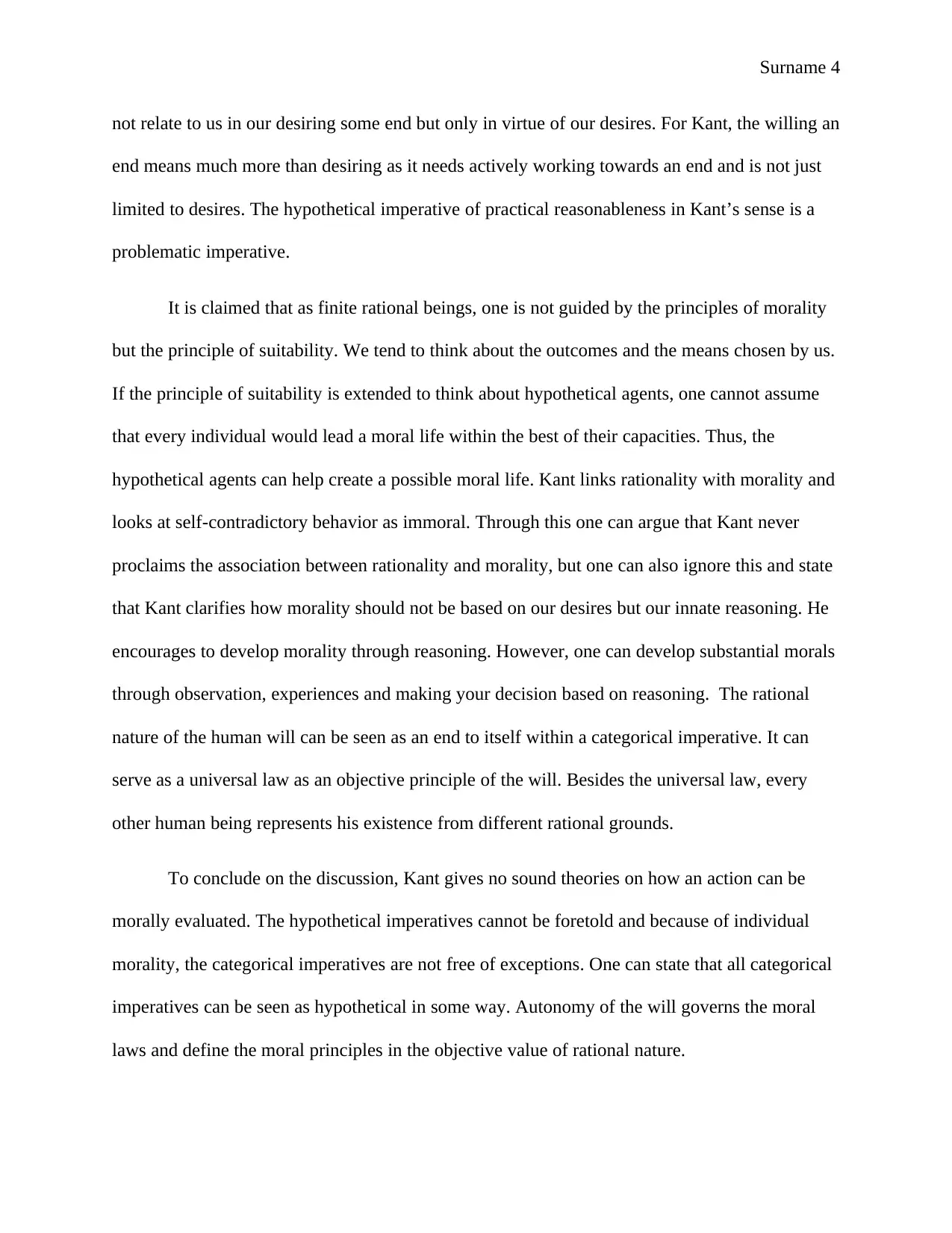
Surname 4
not relate to us in our desiring some end but only in virtue of our desires. For Kant, the willing an
end means much more than desiring as it needs actively working towards an end and is not just
limited to desires. The hypothetical imperative of practical reasonableness in Kant’s sense is a
problematic imperative.
It is claimed that as finite rational beings, one is not guided by the principles of morality
but the principle of suitability. We tend to think about the outcomes and the means chosen by us.
If the principle of suitability is extended to think about hypothetical agents, one cannot assume
that every individual would lead a moral life within the best of their capacities. Thus, the
hypothetical agents can help create a possible moral life. Kant links rationality with morality and
looks at self-contradictory behavior as immoral. Through this one can argue that Kant never
proclaims the association between rationality and morality, but one can also ignore this and state
that Kant clarifies how morality should not be based on our desires but our innate reasoning. He
encourages to develop morality through reasoning. However, one can develop substantial morals
through observation, experiences and making your decision based on reasoning. The rational
nature of the human will can be seen as an end to itself within a categorical imperative. It can
serve as a universal law as an objective principle of the will. Besides the universal law, every
other human being represents his existence from different rational grounds.
To conclude on the discussion, Kant gives no sound theories on how an action can be
morally evaluated. The hypothetical imperatives cannot be foretold and because of individual
morality, the categorical imperatives are not free of exceptions. One can state that all categorical
imperatives can be seen as hypothetical in some way. Autonomy of the will governs the moral
laws and define the moral principles in the objective value of rational nature.
not relate to us in our desiring some end but only in virtue of our desires. For Kant, the willing an
end means much more than desiring as it needs actively working towards an end and is not just
limited to desires. The hypothetical imperative of practical reasonableness in Kant’s sense is a
problematic imperative.
It is claimed that as finite rational beings, one is not guided by the principles of morality
but the principle of suitability. We tend to think about the outcomes and the means chosen by us.
If the principle of suitability is extended to think about hypothetical agents, one cannot assume
that every individual would lead a moral life within the best of their capacities. Thus, the
hypothetical agents can help create a possible moral life. Kant links rationality with morality and
looks at self-contradictory behavior as immoral. Through this one can argue that Kant never
proclaims the association between rationality and morality, but one can also ignore this and state
that Kant clarifies how morality should not be based on our desires but our innate reasoning. He
encourages to develop morality through reasoning. However, one can develop substantial morals
through observation, experiences and making your decision based on reasoning. The rational
nature of the human will can be seen as an end to itself within a categorical imperative. It can
serve as a universal law as an objective principle of the will. Besides the universal law, every
other human being represents his existence from different rational grounds.
To conclude on the discussion, Kant gives no sound theories on how an action can be
morally evaluated. The hypothetical imperatives cannot be foretold and because of individual
morality, the categorical imperatives are not free of exceptions. One can state that all categorical
imperatives can be seen as hypothetical in some way. Autonomy of the will governs the moral
laws and define the moral principles in the objective value of rational nature.
Paraphrase This Document
Need a fresh take? Get an instant paraphrase of this document with our AI Paraphraser
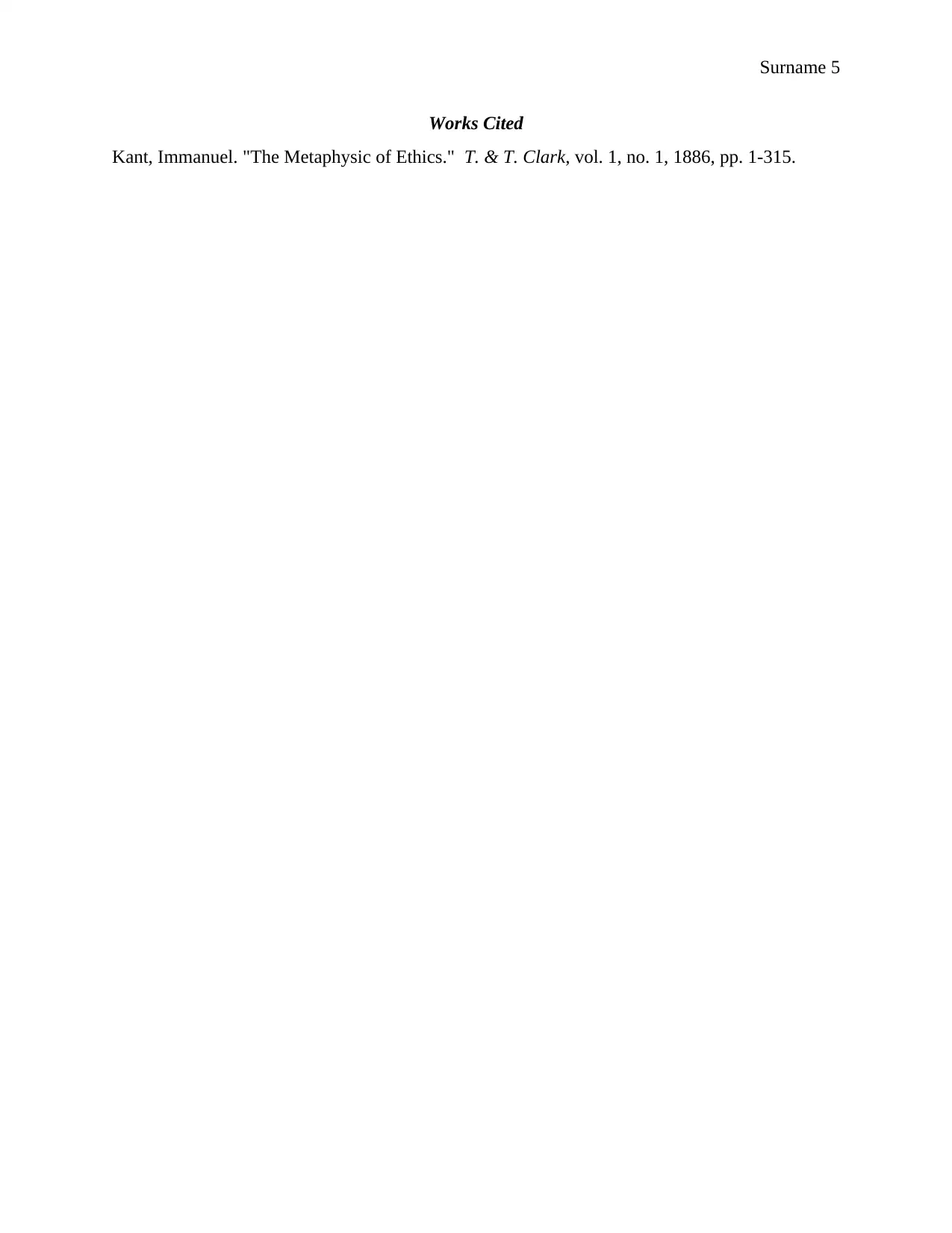
Surname 5
Works Cited
Kant, Immanuel. "The Metaphysic of Ethics." T. & T. Clark, vol. 1, no. 1, 1886, pp. 1-315.
Works Cited
Kant, Immanuel. "The Metaphysic of Ethics." T. & T. Clark, vol. 1, no. 1, 1886, pp. 1-315.
1 out of 5
Related Documents
Your All-in-One AI-Powered Toolkit for Academic Success.
+13062052269
info@desklib.com
Available 24*7 on WhatsApp / Email
![[object Object]](/_next/static/media/star-bottom.7253800d.svg)
Unlock your academic potential
Copyright © 2020–2025 A2Z Services. All Rights Reserved. Developed and managed by ZUCOL.





